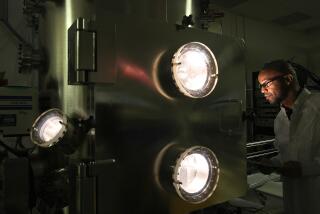$82-Million Rocket Job Goes to General Dynamics in S.D.
- Share via
SAN DIEGO — General Dynamics’ San Diego-based Space Systems Division won an $82.7-million Air Force contract Tuesday to design and demonstrate technology that could be used to manufacture an expendable rocket that would lessen the military’s dependence upon the space shuttle.
“The good news about this contract is that it gives us an ability to be a participant in the next generation launch system,” said Jack Isabel, a General Dynamics spokesman.
General Dynamics, which will do most of the Advanced Launch System (ALS) work in San Diego, will add about 250 employees during the coming year, Isabel said. The firm had about 150 people working on a preliminary study but had to shift most of them to other departments when the funding was held up, Isabel said. “We should be up to about 400 people over the next year or so,” he said.
Besides General Dynamics, the Air Force awarded contracts to Seattle-based Boeing Aerospace and Denver-based Martin Marietta. Boeing was awarded $82.9 million and Martin Marietta, which is teamed with Huntington Beach-based McDonnell Douglas Astronautics, will share a $97.9-million award.
The Air Force has already turned over $12.8 million of the total award to General Dynamics, according to Air Force Lt. Col. Hal R. Meyer. The Air Force has given $13 million to Boeing Aerospace and $14 million to Martin Marietta. The rest of the three contracts will be dispersed during the next two years, according to Meyer.
The Air Force expects the ALS competition to produce a highly dependable rocket that will dramatically reduce the cost of placing satellites and other devices in orbit. The rocket is expected to replace the first generation of rockets that, with refinements, has been in service since the late 1950s and early 1960s.
‘A Lot of New Technology’
“ALS is supposed to involve a lot of new technology, a lot of new manufacturing processes,” according to Isabel. “Eventually, the Air Force will select one company to be the integrating contractor to build the ALS.”
A recent U. S. Office of Technology Assessment study suggested that the ALS should incorporate “new, advanced materials, new operational techniques and advanced manufacturing technologies” to create what the OTA described as “a space truck.”
The ALS is supposed to send a pound of payload into space for about $300, a dramatic reduction from the current $3,000- to $6,000-per-pound cost, according to the OTA report.
General Dynamics and six other companies last year were awarded $5-million contracts to do preliminary work on an ALS design. In August, the Air Force announced that GD, Boeing Aerospace and Martin Marietta had been selected to do further design work. However, funding was not announced at that time.
More to Read
Inside the business of entertainment
The Wide Shot brings you news, analysis and insights on everything from streaming wars to production — and what it all means for the future.
You may occasionally receive promotional content from the Los Angeles Times.










